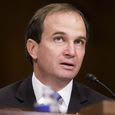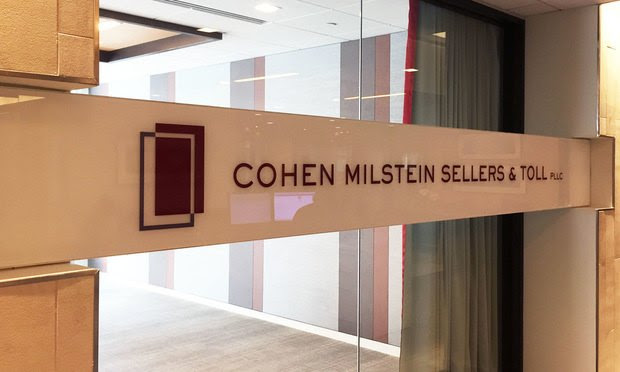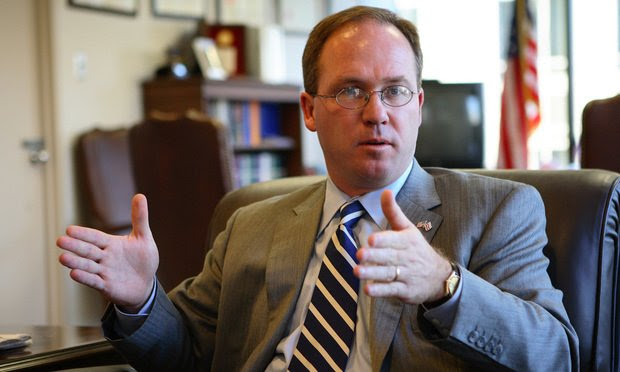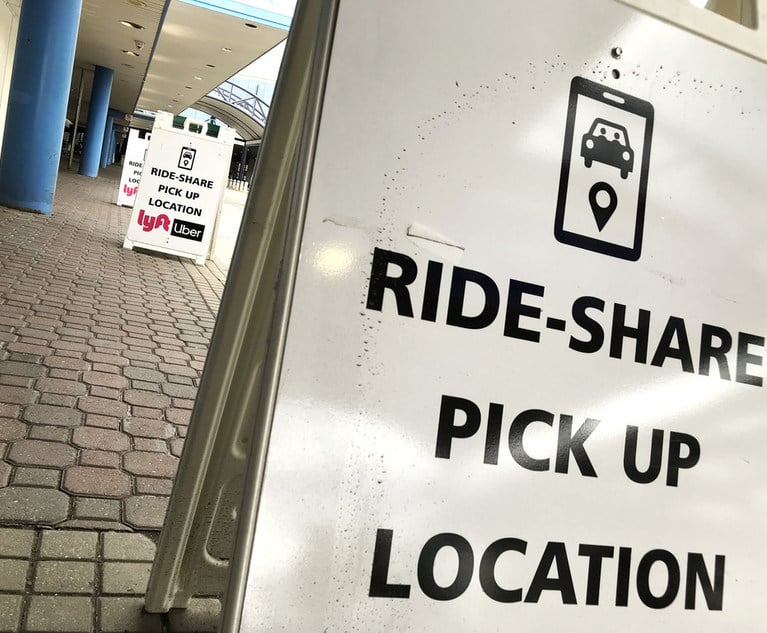Labor of Law: 'Most Favored Nation Status' for Pregnant Employees? | US Appeals Court Gender-Pay Ruling | Who Got the Work & Notable Moves
Lawyers for a company accused of pregnancy discrimination are responding to claims in the Eleventh Circuit, where the case will test the US Supreme Court's Young v. UPS ruling. Plus: the 4th Circuit is out with a new gender-pay ruling, and scroll down for our weekly feature Who Got the Work and notable moves. Thanks for reading!
March 28, 2019 at 12:00 PM
10 minute read
Welcome to Labor of Law. There's a lot to unpack this week—updates on a closely watched pregnancy discrimination case, and a new ruling in the gender-pay arena. Plus: Cohen Milstein's targeting IBM for alleged age discrimination, and Wall Street firms are more than ever disclosing a new risk: sexual harassment. I'm Mike Scarcella in Washington, your host this week. You can reach me at [email protected] and follow me on Twitter @MikeScarcella. Thanks for reading!

Pregnant Workers Don't Get 'Most Favored Nation Status,' Employer Tells Court
The phrase “most favored nation” made quite a few appearances in the 2015 U.S. Supreme Court ruling Young v. United Parcel Service—which wasn't an international trade case but a workplace pregnancy discrimination dispute. The ruling—heraldedas a victory for pregnant workers—is now is getting renewed attention in a federal appeals court, and the lawyers defending the accused company just weighed in.
The case in the U.S. Court of Appeals for the Eleventh Circuit involves an emergency medical technician named Kimberlie Durham, who alleges her employer Rural/Metro Corp. discriminated against her after she became pregnant. An Alabama judge ruled against Durham.
Durham's lawyers, including a team from the American Civil Liberties Union Foundation Women's Rights Project, contend the trial judge's ruling means “the Young case might as well not have been decided.”
Constangy, Brooks, Smith & Prophete partner Steven Moore and senior counsel Heidi Wilbur, representing Rural/Metro, want the appeals court to uphold the finding that the company did not discriminate. A ruling for Durham would “effectively eliminate an employer's ability to offer accommodations to any employees unless the same accommodations were offered to pregnant workers,” Moore and Wilbur wrote in their Eleventh Circuit brief.
“Unlike the plaintiff in Young, there is no evidence in this case that Durham was singled out by virtue of her pregnancy. She was entitled to the same accommodations as all disabled employees and employees with non-occupational injuries,” Rural/Metro's lawyers told the court. “However, there were no accommodations that would have allowed her to continue working as an EMT and there were no vacant positions available to which she could transfer.”
Moore and Wilbur point to some of the things Justice Stephen Breyer said at various points in the Young v UPS ruling. Like this: “We agree with UPS to this extent: We doubt that Congress intended to grant pregnant workers an unconditional most-favored-nation status,” Breyer wrote.
>> In other docket action… there's a new gender-pay ruling in the U.S. Court of Appeals for the Fourth Circuit.
A unanimous panel ruled last week against Equal Pay Act claims brought by Zoe Spencer, a sociology professor at Virginia State University. Spencer, represented by Washington-based lawyer Noah Peters, alleged she was paid less than her two male professors.
The panel said Spencer could not compare her compensation to the two former university administrators. The university's lawyers at Ogletree, Deakins, Nash, Smoak & Stewart argued Spencer's role differed than the two male colleagues, and that their pay was based on their previous salaries.
 “In alleging this necessary equality, a plaintiff may not rely on broad generalizations at a high level of abstraction,” Judge Julius Richardson (at left) wrote for the panel. Richardson also said Spencer needed to show she had evidence that she and her colleagues “had equal jobs, not just that they all performed vaguely related tasks using nominally comparable skills.”
“In alleging this necessary equality, a plaintiff may not rely on broad generalizations at a high level of abstraction,” Judge Julius Richardson (at left) wrote for the panel. Richardson also said Spencer needed to show she had evidence that she and her colleagues “had equal jobs, not just that they all performed vaguely related tasks using nominally comparable skills.”
“The Equal Pay Act is a powerful tool, permitting an employee to prevail on a wage discrimination claim with no evidence of intentional discrimination. But this tool must be tempered by adherence to its provisions,” wrote Richardson, joined by judges J. Harvie Wilkinson III and Henry Floyd. “Doing so requires that the work performed by the plaintiff and her comparators be equal and that the wage disparity not be based on a factor other than sex. Spencer's claim fails on both requirements.”
Ogletree's Jimmy Robinson Jr., the office managing shareholder in Richmond, argued in the Fourth Circuit for Virginia State University. Peters argued for Spencer. You can listen to the argument at this link. Kyle Elliott, an associate in Ogletree's Richmond office and a member of the team defending the university, said in a blog post that the ruling “will undoubtedly become a pivotal Equal Pay Act of 1963 (EPA) case in the context of higher education.”

Who Got the Work
• A team from Cohen Milstein Sellers & Toll, including partners Joseph Sellers and Michael Eisenkraft, sued IBM on Wednesday in U.S. District Court for the Southern District of New York. The complaint alleges violations of the federal Age Discrimination in Employment Act. Lawyers Jeffrey Young and David Webbert of the Augusta, Maine, firm Johnson, Webbert & Young also represent the plaintiffs. An IBM spokesperson told ProPublica following an investigation of the company: “We are proud of our company and our employees' ability to reinvent themselves era after era, while always complying with the law.”
• Lawyers from Kirkland & Ellis, including partner Winn Allen in Washington, were on the team for Honeywell International Inc. in a retiree healthcare benefits case in the U.S. Court of Appeals for the Eighth Circuit. The panel reversed a preliminary injunction. “Plaintiffs have no likelihood of success on their claims that Honeywell's termination of early retiree healthcare benefits breached either the [collective bargaining agreements] or the ERISA plans, and the grant of a preliminary injunction must be reversed,” the appeals court said in its ruling. The law firm said in a statement: “This is the first Eighth Circuit decision addressing the vesting of retiree healthcare benefits decided after the Supreme Court's key decisions in Tackett and Reese. It will be of significance to other employers with substantial operations in Eighth Circuit states.” John G. Adam of the Michigan firm Legghio & Israel argued for the former Honeywell employees.
• Oracle lost a bid to overturn a former employee's motion to compel arbitration. “In a reversal of the typical employer-forces-employee-into-arbitration scenario, Oracle America Inc. has lost out on a bid to overturn an employee's motion to compel arbitration in a dispute over how the enterprise software giant pays commissions,” my colleague Ross Todd reports. Read the Ninth Circuit's ruling here. A team from Vedder Price represented Oracle, and Sanford Heisler Sharp lawyers advocated for plaintiff Marcella Johnson.
• Ballard Spahr white-collar partner Henry Hockeimer Jr. is representing John Dougherty, the “politically powerful leader of the International Brotherhood of Electrical Workers Local 98, believes he is being punished by the federal government for above-board lobbying activities,” my colleague P.J. D'Annunzio writes at The Legal Intelligencer.

Around the Water Cooler
>> Top Wall Street Firms Have Started Disclosing a New Risk to Their Own Businesses: Sexual Harassment. “Public financial companies have significantly stepped up the use of several #MeToo words and phrases in their 2018 annual reports, according to a review of 10-K filings by the data company Sentieo, specifically in their sections focused on risks facing their businesses.” [Business Insider]
>> As the Gig Economy Goes Public, Labor Regulations Still Pose Risk. “Teri Wilford Wood, of counsel at Jackson Lewis and former chief global labor and employment counsel at IBM, said gig economy companies going public should keep an eye on California's new standards and 'be mindful' of possible law changes as they shape their public business,” my colleague Caroline Spiezio reports. [Corporate Counsel] The Los Angeles Times has more here: “California bill curbing use of contractors would not exempt Uber, Lyft, other tech firms.”
>> Legalized Marijuana Gives Hiring Managers a Headache. “Companies facing a shortage of employees from health-care workers to forklift operators are confronting a new challenge: finding candidates who can pass drug tests in states that have legalized marijuana.” [WSJ]
>> Analogic Cleared in Gender Pay Bias Case Brought by DOL. “Analogic Corp. didn't discriminate against female employees by paying them less than male co-workers, a Labor Department administrative law judge ruled March 22. Statistical evidence used by the DOL's Office of Federal Contract Compliance Programs was inadequate to prove pay discrimination by the medical imaging and security technology company based in the Boston area, Judge Colleen Geraghty found.” [Bloomberg Law] Read the decision here.
>> McDonald's Halts Lobbying Against Minimum Wage Hikes. “Fast-food giant McDonald's boosted congressional Democrats' efforts to hike the minimum wage Tuesday by telling the National Restaurant Association that it will no longer participate in lobby efforts against minimum-wage hikes at the federal, state or local level.” [Politico] The New York Times has more here.
>> Why the Ethnicity Pay Gap Is Even More Complicated Than Gender. “Companies in the U.K. are still grappling with the mandatory gender gap reporting reporting that went into effect last year, revealing a widespread disparity in the salaries and bonuses of men and women. Now the British government may require them to similarly analyze the pay of workers of different ethnicities.” [Bloomberg]
>> Split 11th Circuit Court Eases Job Discrimination Standard Slightly. “A split federal appeals court slightly eased the standard it uses to determine when workers qualify to pursue employment discrimination lawsuits and created a circuit split along the way,” my colleague Greg Land reports. [Daily Business Review]

Notable Moves and Announcements
>> Jeff Taylor has been named chief litigation counsel at Fox Corp., where he will oversee litigation, labor and employment, content protection and compliance for all of Fox's operations, which includes Fox News. Taylor earlier was general counsel to Raytheon Corp. and more recently served as General Motors Co. deputy general counsel and chief compliance officer. Taylor will report to Viet Dinh, who joined the company from Kirkland & Ellis.
>> Mark Keenan has joined Barnes & Thornburg as a partner in the firm's labor and employment department in Atlanta. Keenan previously was a partner at Nelson Mullins Riley & Scarborough. Labor and employment law is a “strong suit” for Barnes & Thornburg, the firm's Atlanta managing partner, John Koenig, told my colleague Meredith Hobbs. “We do a lot of traditional labor work, so this is a huge addition for us and our team,” Koenig said.
>> Boston-based Nutter McClennen & Fish has appointed Liam O'Connell and Michael Scott to take over as leaders of the firm later this year. O'Connell is a member of the firm's executive committee and chairs its labor, employment and benefits practice group.
>> Maureen Duffy has joined Baker McKenzie in San Francisco as counsel in the firm's North America employment and compensation practice. Duffy formerly was of counsel at Jackson Lewis.
>> Ciara McLoughlin has joined DLA Piper's global employment practice as a partner in the firm's newly opened Dublin office. McLoughlin had been a partner at the Irish law firm A&L Goodbody.
>> Montgomery McCracken Walker & Rhoads in Pennsylvania announced the election of Renee Nunley Smith to the partnership. Smith is co-chair of the firm's diversity committee and a member of Montgomery McCracken's labor and employment practice.
This content has been archived. It is available through our partners, LexisNexis® and Bloomberg Law.
To view this content, please continue to their sites.
Not a Lexis Subscriber?
Subscribe Now
Not a Bloomberg Law Subscriber?
Subscribe Now
NOT FOR REPRINT
© 2025 ALM Global, LLC, All Rights Reserved. Request academic re-use from www.copyright.com. All other uses, submit a request to [email protected]. For more information visit Asset & Logo Licensing.
You Might Like
View All
Labor of Law: As Workers Suffer With Long Covid, Employers May Rethink Accommodations for Other Disabilities

Labor of Law: Federal Noncompete Ban Would Be Far From Last Word on Issue

Labor of Law: New Federal Rule Could Upend State Efforts to Count Ride-Share Drivers as Contractors

Labor of Law: Employer Statements on Abortion Could Spur Discrimination, Hostile Work Environment Claims
Trending Stories
Who Got The Work
J. Brugh Lower of Gibbons has entered an appearance for industrial equipment supplier Devco Corporation in a pending trademark infringement lawsuit. The suit, accusing the defendant of selling knock-off Graco products, was filed Dec. 18 in New Jersey District Court by Rivkin Radler on behalf of Graco Inc. and Graco Minnesota. The case, assigned to U.S. District Judge Zahid N. Quraishi, is 3:24-cv-11294, Graco Inc. et al v. Devco Corporation.
Who Got The Work
Rebecca Maller-Stein and Kent A. Yalowitz of Arnold & Porter Kaye Scholer have entered their appearances for Hanaco Venture Capital and its executives, Lior Prosor and David Frankel, in a pending securities lawsuit. The action, filed on Dec. 24 in New York Southern District Court by Zell, Aron & Co. on behalf of Goldeneye Advisors, accuses the defendants of negligently and fraudulently managing the plaintiff's $1 million investment. The case, assigned to U.S. District Judge Vernon S. Broderick, is 1:24-cv-09918, Goldeneye Advisors, LLC v. Hanaco Venture Capital, Ltd. et al.
Who Got The Work
Attorneys from A&O Shearman has stepped in as defense counsel for Toronto-Dominion Bank and other defendants in a pending securities class action. The suit, filed Dec. 11 in New York Southern District Court by Bleichmar Fonti & Auld, accuses the defendants of concealing the bank's 'pervasive' deficiencies in regards to its compliance with the Bank Secrecy Act and the quality of its anti-money laundering controls. The case, assigned to U.S. District Judge Arun Subramanian, is 1:24-cv-09445, Gonzalez v. The Toronto-Dominion Bank et al.
Who Got The Work
Crown Castle International, a Pennsylvania company providing shared communications infrastructure, has turned to Luke D. Wolf of Gordon Rees Scully Mansukhani to fend off a pending breach-of-contract lawsuit. The court action, filed Nov. 25 in Michigan Eastern District Court by Hooper Hathaway PC on behalf of The Town Residences LLC, accuses Crown Castle of failing to transfer approximately $30,000 in utility payments from T-Mobile in breach of a roof-top lease and assignment agreement. The case, assigned to U.S. District Judge Susan K. Declercq, is 2:24-cv-13131, The Town Residences LLC v. T-Mobile US, Inc. et al.
Who Got The Work
Wilfred P. Coronato and Daniel M. Schwartz of McCarter & English have stepped in as defense counsel to Electrolux Home Products Inc. in a pending product liability lawsuit. The court action, filed Nov. 26 in New York Eastern District Court by Poulos Lopiccolo PC and Nagel Rice LLP on behalf of David Stern, alleges that the defendant's refrigerators’ drawers and shelving repeatedly break and fall apart within months after purchase. The case, assigned to U.S. District Judge Joan M. Azrack, is 2:24-cv-08204, Stern v. Electrolux Home Products, Inc.
Featured Firms
Law Offices of Gary Martin Hays & Associates, P.C.
(470) 294-1674
Law Offices of Mark E. Salomone
(857) 444-6468
Smith & Hassler
(713) 739-1250








